As campus became the scene of a Kristallnacht-themed rally and chants of ‘Viva, viva, intifada,’ Jewish students felt abandoned by McGill administrators
Article content
In 1926, McGill University imposed a ban on Jewish students. Like other elite colleges at the time – including Harvard, Yale, Columbia and the University of Toronto – the school viewed with suspicion the increasingly Jewish inflection of its student body. Raising the admission standards for Jewish applicants, McGill succeeded in dropping enrolment levels of Jews.
Advertisement 2
Article content
Nearly a hundred years later, McGill students and professors now fear the administration’s indifference to antisemitism on campus is having the same effect, quietly pushing Jewish students off campus. Many say that antisemitism is implicitly tolerated despite university leaders touting the school’s diversity and inclusion.
“McGill always had some antisemitism. Always. It has a long history of it, and it’s always been there,” Dr. Gerald Batist, a professor and former chair of its oncology department, told National Post. “I’ve been shocked at two things. One, is the level of antisemitism. But, number two, is the total abandonment by all of my progressive colleagues and friends; erstwhile close friends.”
Advertisement 3
Article content
The university campus became the scene of escalating demonstrations after the Hamas invasion of Israel and the subsequent war in Gaza. In early November, a coalition of anti-Israel groups organized a “Day of Shutdown” coinciding with the 85th anniversary of Kristallnacht, when Hitler Youth and S.S. forces rampaged across Germany, torching Jewish businesses and synagogues. Kristallnacht is also known as the “Night of Broken Glass,” and the event poster featured demonstrators shattering glass windows.
Article content
Advertisement 4
Article content
“We witnessed troubling situations last year that impacted students, faculty, and staff on our city’s campuses. Among these was the deeply concerning encampment at McGill, which raised serious concerns within the Jewish campus community about their safety and well-being,” Federation CJA, which oversees the campus group Hillel, said in a statement. “Universities have a responsibility to ensure all students feel safe on campus.”
Law student Jamie Fabian remembers those early days of campus life post-October 7 with intense anxiety. Although he’d been politically involved earlier in life, and was one of the youngest-ever school commissioners in Quebec, the grandson of a Holocaust survivor said that debates about the Middle East were never front of mind for him. The militancy of anti-Israel activism, however, changed that, he said.
“I was very close to having mental breakdowns,” he told National Post. “When I saw the Kristallnacht protest – the advertisement for it – I was very depressed after and I was not even going to bother going to class.”
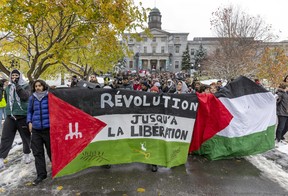
Fabian remembers November being a particularly difficult month. At one point during the fall semester, campus tensions became so high that he had a panic attack. As a Concordia University alumnus, he decided to avoid McGill and he studied at his former school’s library instead, “because it’s mostly Jewish students who study there.”
Advertisement 5
Article content
On the drive over, he ran a stop sign and a cop pulled him over. When the officer asked for his licence and registration, “I just burst into tears,” he recalled. “I had a mental breakdown right then and there.” When the policeman asked what was wrong, Fabian revealed his Star of David necklace. “I said, ‘I can’t go to campus and feel safe.’”
Days after the Kristallnacht-themed rally, the undergraduate student union voted 78 per cent in favour of a resolution demanding McGill divest and boycott Israel. The motion made no reference to Hamas, the hundreds of Israelis abducted by the Palestinian terror group or the October 7 atrocities. University administrators subsequently warned that the measure was a breach of the school’s constitution and could possibly jeopardize the student body’s affiliation and funding with McGill.
The winter semester brought renewed energy to anti-Israel protesters on campus as the war escalated. In mid-February, protesters blockaded the Bronfman building. Activists obstructed entrances and chanted outside the building, forcing administrators to move classes online.
Advertisement 6
Article content
Advertisement 7
Article content
The protesters’ singling out of a building named for a Jewish donor drew the condemnation of local Liberal MP Marc Miller. “The demonstration at, and so-called ‘blockade’ of, a McGill management building named after a prominent Jewish philanthropist is a despicable act and needs to end,” the Trudeau cabinet minister wrote at the time.
Campus life continued to deteriorate in the coming months. In April, activists defaced campus property, renaming buildings after Palestinian towns. “We are at a pivotal moment in our fight against settler colonialism and its violent legacies,” Solidarity for Palestinian Human Rights (SPHR), an influential student group on campus, wrote online. Asked if any sanctions were imposed, the university told National Post in a statement that “privacy law prevents us from commenting on individual cases.”
The spokesperson said, the “University will pursue disciplinary processes against individuals, who have been identified, participating in the encampment or other similar activities to the full extent outlined in our policies. We are also investigating the full spectrum of legal recourses available to us, including the potential recovery of damages.”
Advertisement 8
Article content
Life at McGill took a dark turn, law student Nicole Nashen said, when students and outside activists set up the first anti-Israel encampment in Canada in April. She began hearing chants of “Viva, viva, intifada,” “Go Back to Poland” and “Resistance is justified when people are occupied.” On other occasions, Nashen recalled demonstrators publicly celebrating the Houthi rebels, a Yemen-based terror group that is backed by Iran and calls for the destruction of Israel.
Advertisement 9
Article content
The encampment was spearheaded by SPHR, a group that celebrated the Hamas atrocities a day after the October 7 attack. “The resistance advances through occupied land with one goal: liberation. We salute our brave people on the ground,” the group wrote on Oct. 8 in a still-active Instagram post.
While the encampment leadership was negotiating with McGill administrators, in June, SPHR advertised a “youth summer program” with a poster featuring young people wearing keffiyehs, one armed with an AK-47 pointing skywards. The Instagram post is still active. This was not the group’s first glorification of violence. A month earlier, SPHR released a photo of a keffiyeh-clad man pointing a rifle in an Instagram post promoting a screening of a Palestinian filmmaker’s work entitled, “Revolution Until Victory.”
Advertisement 10
Article content
A university spokesperson said that McGill requested the student union “sever their relationship with SPHR,” underscoring its failure to do so “will be interpreted as their endorsement of SPHR’s activities.” The group was still listed on the student union’s website in August.
Nashen said visiting campus amid such demonstrations was fraught. Bullying and intimidation were commonplace. “As we walk to class and pass signs calling for another intifada, a violent uprising to murder Jews and Israelis, we feel threatened. As we walk to the library and hear protests glorifying Hamas, we feel terrified,” Nashen, who addressed Parliament in May about campus antisemitism, wrote in an email to the Post. “We feel alone.”
Nashen and others said McGill administrators failed to respond to their concerns. Two weeks before the encampment was even set up, anti-Israel activists marched through the university library, disturbing students cramming during exam season without any intervention. The administration’s lax response only appeared to embolden the activists, Nashen said.
Advertisement 11
Article content
Advertisement 12
Article content
A McGill medical student, who asked to remain anonymous because his lab has several Arab and Palestinian researchers who are unaware he is Jewish, said he has been called “kyke” and “Jewboy” since the war began. “My research is highly dependent on the goodwill of my lab mates and if they knew I had these views, they would likely refuse to work with me,” he told the Post in an email.
He shared several images with the Post taken on or surrounding Roddick Gates, the university’s main entrance, as recently as late July, of signs saying Zionists should be barred from campus.
Recommended from Editorial
McGill told the Post that the location is private property, and graffiti is not tolerated on campus. “Community members and guests must respect applicable laws and university policies at all times,” a spokesperson said. Failure to do so, may result in disciplinary measures or a police call, the spokesperson said. “The heightened security presence near Roddick Gates and elsewhere on campus is in place to protect both our community and our property.”
Advertisement 13
Article content
However, images posted on social media show graffitied messages, including “F–k a 2-state solution,” and “The Zionist entity cannot recover from its atrocities. It must be taken down, by any means necessary.”
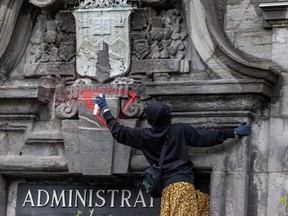
Students say the school has been slow to remove these messages from campus, as well as red triangles, which are a symbol used to identify an enemy of Hamas.
When Hamas leader Ismail Haniyeh was killed in July, activists renamed the sidewalk near the main gates in his honour.
“They have not tried to hide their hateful and antisemitic intent. Rather, our universities have chosen to turn a blind eye rather than stand up for their Jewish students,” Nashen wrote. “The consistent failure of our universities to take action against the hate taking place on our campus has emboldened anti-Israel activists to become more radical. Our universities must take a stand, and where they fail to adequately protect their Jewish students, they must be held accountable.”
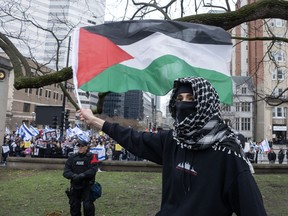
In mid-June, university executives offered increased financial transparency into the school’s investment portfolio, assistance to displaced Palestinian students and amnesty to all activists, including those who earlier occupied the James Administration Building. SPHR, an affiliate of Students for Justice in Palestine (SJP) – an American-based group with alleged ties to Hamas – dismissed the proposal as “laughable.” McGill removed demonstrators in early July after talks broke down.
Advertisement 14
Article content
While McGill negotiated with encampment leaders to reach a compromise, Jewish students accused the same administrators of being deaf to their concerns.
In August, McGill University President Deep Saini wrote in an op-ed that his role requires him to listen to all his students, on both sides of the conflict, after anti-Israel demonstrators had interrupted his convocation speech with shouts of ““Shame on you, Saini! Listen to your students!”
Constructive dialogue is what’s needed, he wrote.
“This is especially so in a moment like the present, when nuanced argument is far too often overtaken by absolutist ideologies that sequester themselves within echo chambers. When advocates demand universities align themselves uniquely with their rhetoric or take actions that essentially aim to decimate or denigrate another party, such a role becomes a non-starter,” he wrote in the Montreal Gazette.
“Too often, such advocates assert that their demands are unquestionably valid and must be met, failing which they will take any and all means to impose their will. This is what universities are up against. It is daunting and dangerous, including and especially for society as a whole.”
Advertisement 15
Article content
Nashen joined over 1,500 students and community members in signing an open letter addressed to McGill leaders, beseeching administrators to “enforce their own rules.” The signatories specifically cited the administration’s amnesty offer to the encampment protesters, which the letter says left them “at a true loss for words.”
“McGill offered amnesty to the individuals of the encampment who had explicitly broken the student code, spat at the dean, and orchestrated the systematic exclusion and intimidation of our community,” the letter says.
Advertisement 16
Article content
“It is irrational for the administration to willingly reward those who brazenly violate the student code, vandalize property, harass students, chant violent slogans, and hang effigies which invert the memory of the Holocaust by equating Israel with Nazi Germany…. Are all rules at McGill optional, or are they only disregarded when Jewish students are the victims? How much more will be tolerated? What is the McGill administration waiting for — a public lynching of one of their Jewish students, or will they once again grant amnesty to those who break the law?”
Students and professors said McGill’s medical school, in particular, is a hotbed of antisemitism. Screenshots obtained by the Post reveal several members of the school expressing outright support for the Oct. 7 atrocities in the hours and days after the attack.
Gordan Samoukovic, a cardiothoracic surgeon at the school, shared an Instagram post showing an image of a broken Israeli border fence – an image conjuring up the October 7 attacks – with a man holding a Palestinian flag in his right hand and flashing the peace sign with his other. “Nothing here is unprovoked,” he wrote following the atrocities. “75 years of oppression, apartheid, settler colonialism and systemic extermination creates radicalism. Free Palestine!”
Advertisement 17
Article content
The following day, Arij Soufi, the co-president of McGill’s Muslim Medical Association chapter and the faculty’s equity commissioner, shared a protest in Montreal on Oct. 8. The event called the atrocities “a heroic attack” and boasted about the abduction of “over 30 hostages.”
McGill would not say if either Soufi or Samoukovic, were disciplined, citing privacy considerations. Samoukovic and Soufi did not respond to the Post’s requests for comment.
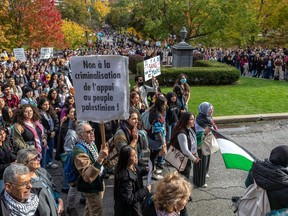
In late October, when an Israeli academic expressed how traumatic the October 7 attack was and asked for a show of support, McGill medical fellow Abdulhameed Al-Ghabkari responded: “Raped!!! How come we should trust your science?” He accused another Israeli researcher, who had shared his recent research as an example of the positive Jewish contribution to society, of “contributing very well in this genocide!” and told him “to have fun (dancing) over kids bodies.”
McGill would not comment on whether Al-Ghabkari was disciplined for his comments, citing “privacy laws.” Al-Ghabkari did not respond to the Post’s request for comment.
Advertisement 18
Article content
“I think Jews were extremely disappointed by the behaviour of McGill in general after October 7,” Dr. Karl Weiss, an infectious disease specialist at the university, told the Post.
Weiss was among 400 medical professionals who joined the Quebec Jewish Medical Association, founded in November 2023, to push back against antisemitism flourishing in the field. He said he feels that McGill is no longer a safe learning environment.
Batist, the McGill oncology professor, said he thinks the school would have been more responsive to expressions of racism or sexist comments. Batist blamed “a lack of definition” for the antisemitism witnessed on campus. “It’s not even politically incorrect to be antisemitic anymore. All of the forces that make people behave … none of that is in place,” he said.
Students and faculty lobbied Saini, the McGill president, in mid-June to adopt the International Holocaust Remembrance Alliance (IHRA) working definition of antisemitism, something which Quebec, Ontario and the federal government have done in recent years. The university confirmed that Jewish members of the McGill community had proposed the IHRA definition but added that “others have said the University should not.”
Advertisement 19
Article content
“McGill does not define any particular form of social oppression or discrimination (e.g., racism, misogyny, bi/trans/homophobia). Rather, our policies follow applicable human rights law, pursuant to which discrimination or harassment on the basis of a protected ground (which includes religious, ethnic, and/or cultural identity) is prohibited and subject to disciplinary measures,” a spokesperson told the Post.
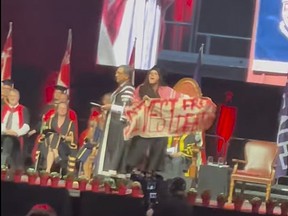
Nashen said the majority of Jewish students she’d spoken to on campus supported the initiative.
“As we enter the new academic year, we hope to see meaningful changes, with new preventive measures in place and consequences enforced when violations of university policies occur,” Federation CJA said in a statement.
McGill stated that given “recent events on North American campuses and around the world, it is more important than ever that we stand with Jewish community members who are feeling especially vulnerable.” A spokesperson pointed to the administration’s work calling out “antisemitic posters as well as intimidation emanating from the encampment,” which, they added, was “a driving factor for the removal of the encampment.”
Advertisement 20
Article content
To Batist, the sentiment amounted to window dressing obscuring the university’s unwillingness to take a stance against intolerance in their midst. “Nobody’s been expelled. There’s no rules about unmasking. There’s no rules about language,” he said. McGill said it could not comment on whether anyone had been expelled due to privacy concerns.
Faculty members and students like Weiss and Fabian are beginning to question whether there is a sustainable future for Jewish students at McGill. The latter encouraged prospective Jewish students to “strongly reconsider” their decision to attend due to a “useless” administration detached from the concerns of the community. He now wishes classes would return online to avoid physical attendance.
The anonymous medical student’s goal is “to finish my degree as quickly as possible, and then leave McGill and Montreal as soon as I can.” He has no interest in applying to any one of the prestigious hospitals in the university-affiliated orbit.
Still, he doesn’t recommend an outright retreat from McGill. But high school hopefuls need to “make sure they have appropriate community and family supports in place, and to avoid openly displaying Jewish symbols or religious items while on campus or near protests.” He no longer believes the school can protect “observant or openly Jewish students.”
Advertisement 21
Article content
“I believe that my experience as a McGill medical student has been irreparably damaged by the administration’s poor choices and cowardice in confronting the surge of antisemitism that took place on their campus this past year,” he said in an email. He fears that with occupying buildings and taking over common spaces now normalized, there could be more of the same as the new semester begins.
The concern is being raised by political leaders, as well. In mid-August, Montreal MP Anthony Housefather and Deborah Lyons, the special envoy on preserving Holocaust remembrance and combatting antisemitism, released a joint letter calling on schools to ensure a safe return to campus.
“Last year, many Jewish students, staff and faculty did not feel safe on campus. They felt unsafe being visibly Jewish, sharing their identity and unsafe sharing their support for the State of Israel,” they wrote. “This needs to change and it requires your leadership.”
Advertisement 22
Article content
Their recommendations included university administrations preparing ahead of the one-year commemoration of October 7 to “anticipate and mitigate disruptions,” and communicate “a clear understanding that encampments are not permitted.” Housefather, a Liberal MP recently appointed as Prime Minister Trudeau’s special advisor on antisemitism, told the Post that the initiative was “one of the … biggest issues facing Jewish communities right now in terms of things they’re most fearful of.”
It’s been a particularly painful, soul-searching, ten months, for Batist, a self-described ‘60s “antiwar activist” schooled in the principles of human rights. He’d mostly dropped his political activism after attending New York’s Columbia University against the backdrop of the war in Vietnam and helping the refuseniks, Soviet Jewry seeking to flee the Iron Curtain decades ago.
But the Hamas attacks and the subsequent antisemitism at McGill rekindled his interest. “I’m really interested in kind of elevating the discourse, not yelling back and forth. My focus really is on trying to find some kind of rational dialogue,” he said.
Advertisement 23
Article content
However, his attempts to sit down and speak with the protesters were rebuffed. He said most were censored by encampment media leaders. That struck Batist as antithetical to the very mission of higher education.
His son, who’d graduated from McGill’s law school nearly a decade ago, had experienced something similar during his time on campus. Any degree of sympathetic dialogue on Israel was tantamount to career suicide, he said.
“This was eight years ago,” Batist said. “So, I would not encourage anyone (to go). I would look for other places. I really would. At this point in time, I’m not sure that McGill is ready to turn a corner.”
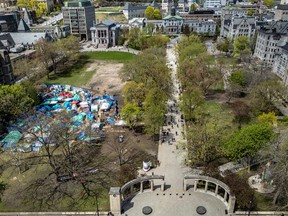
Our website is the place for the latest breaking news, exclusive scoops, longreads and provocative commentary. Please bookmark nationalpost.com and sign up for our daily newsletter, Posted, here.
Article content









